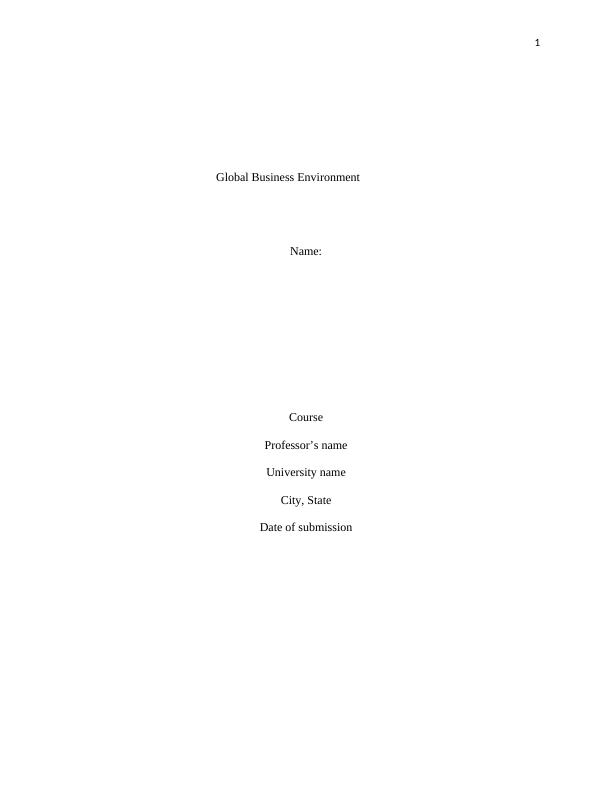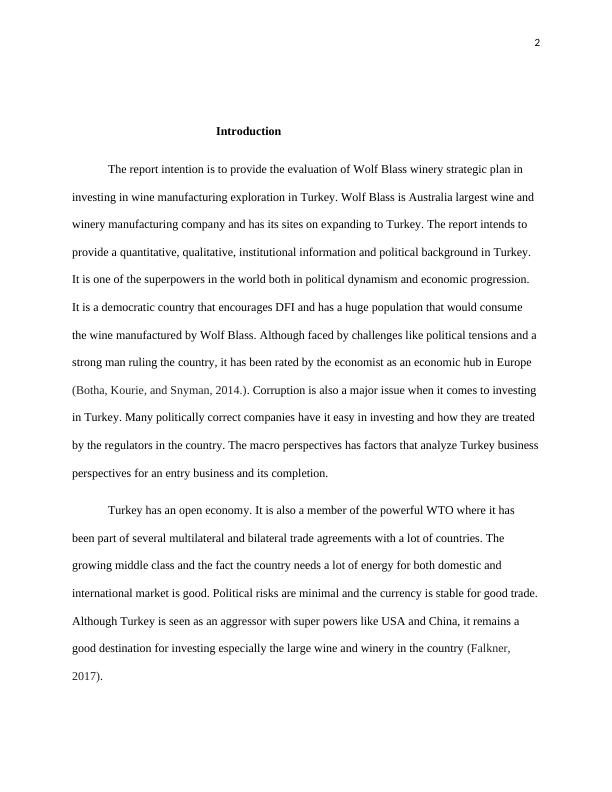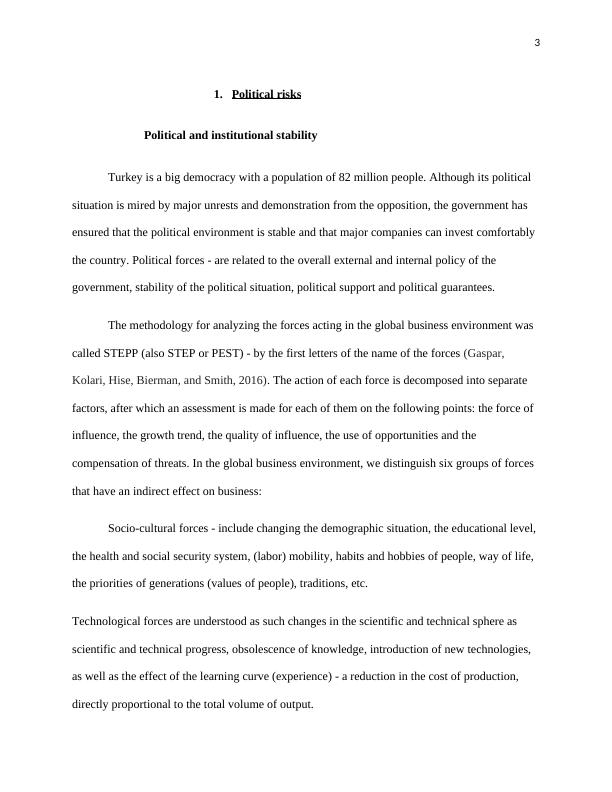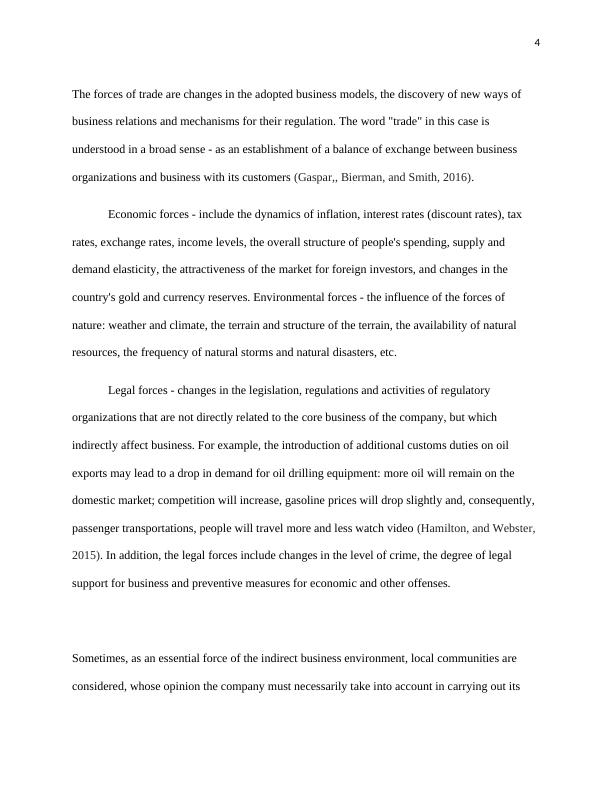Evaluation of Wolf Blass Winery's Strategic Plan in Turkey
Added on 2023-06-04
15 Pages4021 Words140 Views
1
Global Business Environment
Name:
Course
Professor’s name
University name
City, State
Date of submission
Global Business Environment
Name:
Course
Professor’s name
University name
City, State
Date of submission

2
Introduction
The report intention is to provide the evaluation of Wolf Blass winery strategic plan in
investing in wine manufacturing exploration in Turkey. Wolf Blass is Australia largest wine and
winery manufacturing company and has its sites on expanding to Turkey. The report intends to
provide a quantitative, qualitative, institutional information and political background in Turkey.
It is one of the superpowers in the world both in political dynamism and economic progression.
It is a democratic country that encourages DFI and has a huge population that would consume
the wine manufactured by Wolf Blass. Although faced by challenges like political tensions and a
strong man ruling the country, it has been rated by the economist as an economic hub in Europe
(Botha, Kourie, and Snyman, 2014.). Corruption is also a major issue when it comes to investing
in Turkey. Many politically correct companies have it easy in investing and how they are treated
by the regulators in the country. The macro perspectives has factors that analyze Turkey business
perspectives for an entry business and its completion.
Turkey has an open economy. It is also a member of the powerful WTO where it has
been part of several multilateral and bilateral trade agreements with a lot of countries. The
growing middle class and the fact the country needs a lot of energy for both domestic and
international market is good. Political risks are minimal and the currency is stable for good trade.
Although Turkey is seen as an aggressor with super powers like USA and China, it remains a
good destination for investing especially the large wine and winery in the country (Falkner,
2017).
Introduction
The report intention is to provide the evaluation of Wolf Blass winery strategic plan in
investing in wine manufacturing exploration in Turkey. Wolf Blass is Australia largest wine and
winery manufacturing company and has its sites on expanding to Turkey. The report intends to
provide a quantitative, qualitative, institutional information and political background in Turkey.
It is one of the superpowers in the world both in political dynamism and economic progression.
It is a democratic country that encourages DFI and has a huge population that would consume
the wine manufactured by Wolf Blass. Although faced by challenges like political tensions and a
strong man ruling the country, it has been rated by the economist as an economic hub in Europe
(Botha, Kourie, and Snyman, 2014.). Corruption is also a major issue when it comes to investing
in Turkey. Many politically correct companies have it easy in investing and how they are treated
by the regulators in the country. The macro perspectives has factors that analyze Turkey business
perspectives for an entry business and its completion.
Turkey has an open economy. It is also a member of the powerful WTO where it has
been part of several multilateral and bilateral trade agreements with a lot of countries. The
growing middle class and the fact the country needs a lot of energy for both domestic and
international market is good. Political risks are minimal and the currency is stable for good trade.
Although Turkey is seen as an aggressor with super powers like USA and China, it remains a
good destination for investing especially the large wine and winery in the country (Falkner,
2017).

3
1. Political risks
Political and institutional stability
Turkey is a big democracy with a population of 82 million people. Although its political
situation is mired by major unrests and demonstration from the opposition, the government has
ensured that the political environment is stable and that major companies can invest comfortably
the country. Political forces - are related to the overall external and internal policy of the
government, stability of the political situation, political support and political guarantees.
The methodology for analyzing the forces acting in the global business environment was
called STEPP (also STEP or PEST) - by the first letters of the name of the forces (Gaspar,
Kolari, Hise, Bierman, and Smith, 2016). The action of each force is decomposed into separate
factors, after which an assessment is made for each of them on the following points: the force of
influence, the growth trend, the quality of influence, the use of opportunities and the
compensation of threats. In the global business environment, we distinguish six groups of forces
that have an indirect effect on business:
Socio-cultural forces - include changing the demographic situation, the educational level,
the health and social security system, (labor) mobility, habits and hobbies of people, way of life,
the priorities of generations (values of people), traditions, etc.
Technological forces are understood as such changes in the scientific and technical sphere as
scientific and technical progress, obsolescence of knowledge, introduction of new technologies,
as well as the effect of the learning curve (experience) - a reduction in the cost of production,
directly proportional to the total volume of output.
1. Political risks
Political and institutional stability
Turkey is a big democracy with a population of 82 million people. Although its political
situation is mired by major unrests and demonstration from the opposition, the government has
ensured that the political environment is stable and that major companies can invest comfortably
the country. Political forces - are related to the overall external and internal policy of the
government, stability of the political situation, political support and political guarantees.
The methodology for analyzing the forces acting in the global business environment was
called STEPP (also STEP or PEST) - by the first letters of the name of the forces (Gaspar,
Kolari, Hise, Bierman, and Smith, 2016). The action of each force is decomposed into separate
factors, after which an assessment is made for each of them on the following points: the force of
influence, the growth trend, the quality of influence, the use of opportunities and the
compensation of threats. In the global business environment, we distinguish six groups of forces
that have an indirect effect on business:
Socio-cultural forces - include changing the demographic situation, the educational level,
the health and social security system, (labor) mobility, habits and hobbies of people, way of life,
the priorities of generations (values of people), traditions, etc.
Technological forces are understood as such changes in the scientific and technical sphere as
scientific and technical progress, obsolescence of knowledge, introduction of new technologies,
as well as the effect of the learning curve (experience) - a reduction in the cost of production,
directly proportional to the total volume of output.

4
The forces of trade are changes in the adopted business models, the discovery of new ways of
business relations and mechanisms for their regulation. The word "trade" in this case is
understood in a broad sense - as an establishment of a balance of exchange between business
organizations and business with its customers (Gaspar,, Bierman, and Smith, 2016).
Economic forces - include the dynamics of inflation, interest rates (discount rates), tax
rates, exchange rates, income levels, the overall structure of people's spending, supply and
demand elasticity, the attractiveness of the market for foreign investors, and changes in the
country's gold and currency reserves. Environmental forces - the influence of the forces of
nature: weather and climate, the terrain and structure of the terrain, the availability of natural
resources, the frequency of natural storms and natural disasters, etc.
Legal forces - changes in the legislation, regulations and activities of regulatory
organizations that are not directly related to the core business of the company, but which
indirectly affect business. For example, the introduction of additional customs duties on oil
exports may lead to a drop in demand for oil drilling equipment: more oil will remain on the
domestic market; competition will increase, gasoline prices will drop slightly and, consequently,
passenger transportations, people will travel more and less watch video (Hamilton, and Webster,
2015). In addition, the legal forces include changes in the level of crime, the degree of legal
support for business and preventive measures for economic and other offenses.
Sometimes, as an essential force of the indirect business environment, local communities are
considered, whose opinion the company must necessarily take into account in carrying out its
The forces of trade are changes in the adopted business models, the discovery of new ways of
business relations and mechanisms for their regulation. The word "trade" in this case is
understood in a broad sense - as an establishment of a balance of exchange between business
organizations and business with its customers (Gaspar,, Bierman, and Smith, 2016).
Economic forces - include the dynamics of inflation, interest rates (discount rates), tax
rates, exchange rates, income levels, the overall structure of people's spending, supply and
demand elasticity, the attractiveness of the market for foreign investors, and changes in the
country's gold and currency reserves. Environmental forces - the influence of the forces of
nature: weather and climate, the terrain and structure of the terrain, the availability of natural
resources, the frequency of natural storms and natural disasters, etc.
Legal forces - changes in the legislation, regulations and activities of regulatory
organizations that are not directly related to the core business of the company, but which
indirectly affect business. For example, the introduction of additional customs duties on oil
exports may lead to a drop in demand for oil drilling equipment: more oil will remain on the
domestic market; competition will increase, gasoline prices will drop slightly and, consequently,
passenger transportations, people will travel more and less watch video (Hamilton, and Webster,
2015). In addition, the legal forces include changes in the level of crime, the degree of legal
support for business and preventive measures for economic and other offenses.
Sometimes, as an essential force of the indirect business environment, local communities are
considered, whose opinion the company must necessarily take into account in carrying out its

End of preview
Want to access all the pages? Upload your documents or become a member.
Related Documents
Assessing Turkey as an Emerging Market for Business Capitalizationlg...
|6
|1081
|184
Political Environment and Risk | Assignmentlg...
|10
|2186
|64
International Business Across Borders: A Study on Bulgarialg...
|10
|1008
|407
Business Organisations and Environments on Dior Assignmentlg...
|12
|3294
|623
Study On Economic Conditions Of Turkeylg...
|23
|7054
|78
Assessing Turkey Wine Industry for Kraft-Foods Grouplg...
|17
|4042
|470